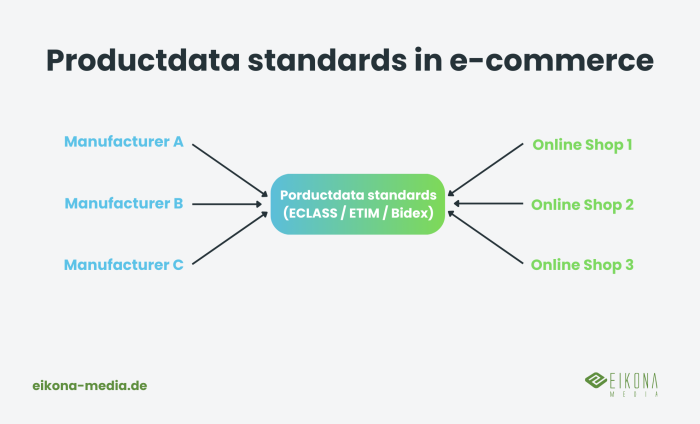Productdata standards in e-commerce: Why you should know about ECLASS, Open Datacheck, and Bidex

Product data chaos costs time and money. With standards such as ECLASS, Open Datacheck, and Bidex, you can finally bring structure to your product range and become less dependent on marketplace giants. Find out why this is worthwhile for you here.
Uniform standards for data exchange
If you are an online retailer, you are probably familiar with this problem: you receive product data from manufacturers in a wide variety of formats – sometimes as Excel files, sometimes as JSON, sometimes even as faxes. No joke, this really happens.
Chaos in product data costs time, nerves, and revenue. It slows down your growth and makes it difficult to list new products. The solution is actually quite simple: uniform standards for data exchange. Fortunately, there are several established systems for this very purpose, which we will now take a closer look at.
Why product data standards are important
Essentially, it's about efficiency and scalability. Imagine receiving cleanly structured, complete, and verified product data from every manufacturer. No post-processing, no queries, no copy-paste marathon. You can get started right away, listing, promoting, and selling products.
For manufacturers, this naturally involves a certain amount of effort: they have to maintain and update their data and provide it in a consistent quality. But the effort is worth it. High-quality, standardized data enables a much greater reach without having to rely completely on platforms such as Amazon.
Overview of three major systems
1. ECLASS – the classic among standards
ECLASS is something like the forefather of product data classification. The system is based on a standardized feature model that is aligned with international standards – one of the most important of which is IEC 61360-4. This means that each product is assigned a unique category and is described by standardized features. From materials and technical properties to geometry.
ECLASS is ISO-compliant and established in many industries worldwide. ECLASS offers enormous advantages, especially in industry and for technical products: Companies can procure faster and more accurately, ERP systems can process the data directly, and uniform structures are invaluable for international trade.
2. ETIM & Open Datacheck – the power duo for the building services and electrical industry
ETIM stands for “ElectroTechnical Information Model” and is an internationally coordinated classification standard specifically for the electrical sector. ETIM was founded in 1999 – originally by electrical wholesalers, with manufacturers joining later. ETIM now also covers areas such as plumbing, heating, air conditioning, and ventilation.
The data structure is based on the BMEcat format, a standardized exchange format for product catalogs. What makes ETIM special is that it is not just a technical standard, but a cooperative model with international partners and national companies.
Open Datacheck complements ETIM perfectly. This is a central platform where manufacturers can upload their product data, including images and documentation. What makes it special is that the data is checked and evaluated. There is a scorecard that makes the quality of the data transparent. Retailers benefit twice over: they can rely on the data and save a huge amount of time in maintenance. Over 350 manufacturers already use the platform and the trend is rising.
3. Bidex – the industry standard for bicycle retailers
At first glance, Bidex is a special case, but a very exciting one. The system is aimed at the bicycle industry and has become almost indispensable there. The focus is on three things: auf den ersten Blick ein Spezialfall, aber ein sehr spannender. Das System richtet sich an die Fahrradbranche und ist dort inzwischen fast unverzichtbar. Der Fokus liegt auf drei Dingen:
- Uniform product data
- Inventory and availability data
- Easy integration into retailer websites
Bidex collects product data from over 70 manufacturers and makes it available to retailers, even those without their own online shop. You get a fully integrated website with product information, availability, and daily updated prices. Since summer 2025, our customer ZEG (Zweirad-Einkaufs-Genossenschaft) has also been part of the system. This gives Bidex a real boost, both in terms of distribution and data quality.
What Bidex is still missing: an official quality assessment of the data, for example in the form of a scorecard. But development is moving in the right direction, and with increasing market coverage, the pressure on manufacturers to provide clean and complete data is also growing.
What's in it for you?
It's simple: with structured, verified product data, you can sell much faster and better. You reduce the effort required for manual post-processing to a minimum, avoid errors, and offer your customers a better shopping experience.
At the same time, platforms such as Open Datacheck or Bidex help you to become a little more independent from the large marketplaces. Because when many retailers receive the same high-quality data, the visibility of individual products increases without Amazon & Co. always having to earn a share of the profits.
But how am I supposed to stand out?
Good question, because if everyone gets the same data, it becomes difficult to differentiate yourself based on your product range alone. But this is exactly where you come in.
The key lies in the smart use of this data. You don't have to simply adopt the product information – you can curate, enrich, and contextualize it. You can use it to create better product descriptions, build smarter filters, or design more visually appealing product pages.
It's not just about “having” it, but about “using” it. Those who manage to offer a better shopping experience based on uniform standards will win. Customers buy where they feel well informed and not necessarily where the price is lowest.
Conclusion
Standards bring clarity and opportunities
Bidex, Open Datacheck, and ECLASS demonstrate how important standardized product data has become in e-commerce. They create transparency, efficiency, and fairness and also give smaller retailers the opportunity to position themselves professionally in the market.
If you use these standards wisely and don't just see them as a mandatory task, you have the chance to stand out from the crowd. Quality, structure, and user-friendliness pay off in the long term - for you, your customers, and your suppliers.
And we - EIKONA Media - are happy to help you if you want to bring your data up to standard or, in a further step, prepare standardized data optimally for the customer experience.

